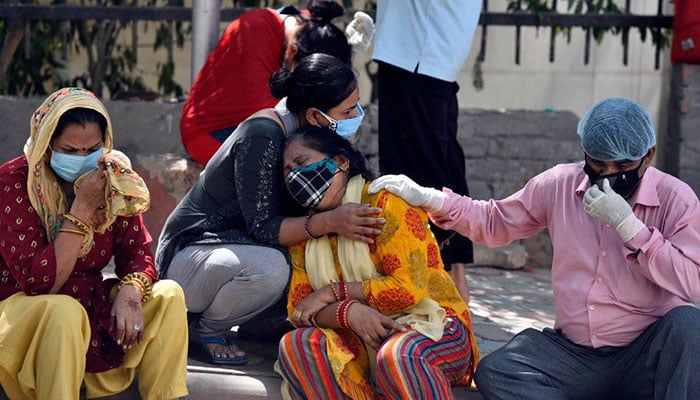Indian variant becomes global threat
GENEVA: The World Health Organisation (WHO) had announced that it reclassifying the highly contagious triple-mutant Covid variant in India as a “variant of concern,” indicating that it’s become a global health threat, foreign media reported on Tuesday.
The announcement was made by WHO lead COVID-19 scientist, Maria van Kerkhove, who said, "There is some available information to suggest increased transmissibility of the B.1.617." She also said that this new variant is not the only one circulating in India, noting that the British B.1.1.7 variant, which has been shown to have increased transmissibility, is also present there.
Will vaccines still work on the new Indian variant? After noting that the Indian variant may be more resistant to vaccines, the US epidemiologist said, "as such, we are classifying this as a variant of concern at the global level." She said the variant had already spread to other countries outside India.
Van Kerkhove promised more information on Tuesday, when the WHO presents its weekly epidemiological update, though she said "we don't have anything to suggest that our diagnostics or therapeutics and our vaccines don't work."
WHO Chief Scientist Soumya Swaminathan said there was no data on the impact of the variant on diagnostics, therapeutics or vaccine effectiveness. However, it was "more transmissible, based on which it is a VOC."
Observers fear that the variant may be what is driving India's skyrocketing infection and death rates, though van Kerkhove said a number of other factors were at work, including "social mixing and the relaxation of some public health and social measures."
On Monday, health authorities in the South Asian country reported 370,000 new coronavirus infections and 3,700 deaths. The virus has utterly overwhelmed India's health system and experts say the actual numbers are likely far higher.
What is a variant of concern?
Variants of concern are those considered more dangerous than the original form of the virus first seen in China in late 2019. That danger stems from a variant's higher transmissibility, lethality and resistance to vaccines. The Indian variant will now join the Brazilian, British and South African mutations also classified as being "of concern" by the global health authority.
Experts fear that as the virus continues to spread it will seek ideal conditions and continue to mutate. "We will continue to see variants of concern around the world and we must do everything that we can to really limit the spread," van Kerkhove said.
The WHO says that although most regions around the world are currently registering fewer infections, South Asia and Southeast Asia are experiencing dramatic increases.
-
 Blac Chyna Reveals Her New Approach To Love, Healing After Recent Heartbreak
Blac Chyna Reveals Her New Approach To Love, Healing After Recent Heartbreak -
 Royal Family's Approach To Deal With Andrew Finally Revealed
Royal Family's Approach To Deal With Andrew Finally Revealed -
 Super Bowl Weekend Deals Blow To 'Melania' Documentary's Box Office
Super Bowl Weekend Deals Blow To 'Melania' Documentary's Box Office -
 Meghan Markle Shares Glitzy Clips From Fifteen Percent Pledge Gala
Meghan Markle Shares Glitzy Clips From Fifteen Percent Pledge Gala -
 Melissa Jon Hart Explains Rare Reason Behind Not Revisting Old Roles
Melissa Jon Hart Explains Rare Reason Behind Not Revisting Old Roles -
 Meghan Markle Eyeing On ‘Queen’ As Ultimate Goal
Meghan Markle Eyeing On ‘Queen’ As Ultimate Goal -
 Kate Middleton Insists She Would Never Undermine Queen Camilla
Kate Middleton Insists She Would Never Undermine Queen Camilla -
 Japan Elects Takaichi As First Woman Prime Minister After Sweeping Vote
Japan Elects Takaichi As First Woman Prime Minister After Sweeping Vote -
 King Charles 'terrified' Andrew's Scandal Will End His Reign
King Charles 'terrified' Andrew's Scandal Will End His Reign -
 Winter Olympics 2026: Lindsey Vonn’s Olympic Comeback Ends In Devastating Downhill Crash
Winter Olympics 2026: Lindsey Vonn’s Olympic Comeback Ends In Devastating Downhill Crash -
 Adrien Brody Opens Up About His Football Fandom Amid '2026 Super Bowl'
Adrien Brody Opens Up About His Football Fandom Amid '2026 Super Bowl' -
 Barbra Streisand's Obsession With Cloning Revealed
Barbra Streisand's Obsession With Cloning Revealed -
 What Did Olivia Colman Tell Her Husband About Her Gender?
What Did Olivia Colman Tell Her Husband About Her Gender? -
 'We Were Deceived': Noam Chomsky's Wife Regrets Epstein Association
'We Were Deceived': Noam Chomsky's Wife Regrets Epstein Association -
 Patriots' WAGs Slam Cardi B Amid Plans For Super Bowl Party: She Is 'attention-seeker'
Patriots' WAGs Slam Cardi B Amid Plans For Super Bowl Party: She Is 'attention-seeker' -
 Martha Stewart On Surviving Rigorous Times Amid Upcoming Memoir Release
Martha Stewart On Surviving Rigorous Times Amid Upcoming Memoir Release




